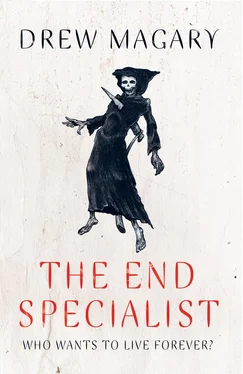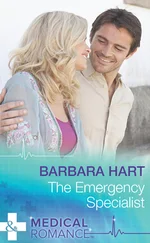I immediately pictured myself being gunned down in an alleyway, a smoking revolver barrel the last thing my eyes ever have a chance to focus on. Then the sliding door in my brain shifted and I was eighty-five years old on my deathbed, fat nurses sponging off my rotting skin.
“I don’t think most people die natural, peaceful deaths,” I said. “All the loved ones I’ve seen die have died sick, frail, and helpless. Undergoing chemo. Lying in hospitals. Soiling their beds. Two of my grandparents died alone, with no one to talk to. I don’t think natural death offers much in the way of gentle relief. I think it’s a slow, wrenching thing I’d like to get far, far away from.”
“Okay.”
He stood up and gestured to me to do the same.
“How many of your patients have come back after two weeks and decided they didn’t want the cure?”
“Oh, I think you already know the answer to that. Come on. We’ll take your blood in my lab.”
He walked me over to the apartment’s open kitchen. The cupboards and drawers were all white, painted ages ago and done so in a sloppy fashion, with big streaks of dripping paint frozen and hardened in places. Inside the cabinets, where you normally would see dishes, glasses and assorted sundries, were medical supplies: swabs, gauze, syringes, scalpels, tongue depressors, etc. I marveled at the lack of food or items to help prepare it. He quickly got out everything he needed to extract the blood and slapped a tourniquet onto my arm.
“What do you do if you want to eat here?” I asked him.
“I never eat here. Tell me, what do you do for a living?”
“I’m a lawyer.”
“Oh, dear. Another lawyer? I should put a moratorium on you folks. Last thing we need are a bunch of godforsaken lawyers hanging around forever. Here comes the needle.”
He pulled my arm toward him, gave a firm slap to the underside of my elbow, and drew one large vial of my blood. I’d never stopped to consider my own blood before. I’d only really thought of it as the fluid that occasionally seeps out of my body, causing me great alarm. Nothing deeper than that. Now I stared at the blood filling the vial, and it was that deep, rich, unmistakable red, the kind of red they try to reproduce in paint and in lipstick but can never quite match. It looked vital, as if it had its own pulse. Active. Alive. If all went according to plan, I thought, it would soon return to me even more so.
“Let me ask you something, Doc.”
“Of course.”
“What’s your normal practice? What’s your doctor day job?”
“Orthopedics.”
“Ah.”
“I almost went in to plastic surgery, but I didn’t. Thank goodness. Those guys will be doing nothing but sucking out fat from now on.”
“So you run a successful practice, yes? I assume you make a nice living just through your day job.”
“That I do.”
“Then why do this? Why do more than what you need to do? Why risk losing your license to practice medicine by giving this out? Hell, you’re risking your life. What’s the benefit to you, besides making extra money you really don’t need?”
He grinned. “Well John, with this cure I have the power to grant anyone the ability to live thousands of years—possibly forever. Let’s just say it appeals to my curiosity.”
He bandaged me up.
“This won’t cause me to sprout fangs and sleep in a coffin, will it?”
“No, that’s a different gene. Would you like me to alter that one?”
“No, no thank you.”
“Well, you’re all set. I have you in the books for this same time two weeks from now. Don’t bother calling to confirm. Just show up with your money—no denominations higher than fifty dollars, please. I’ll be here.”
(Note: The total cost was seven thousand dollars. Not bad.)
I walked to the door. Four million more questions flooded into my brain. I felt the urge to ask all of them simultaneously. Instead, I offered only one.
“One last thing.”
“Sure,” he said.
“Have you given it to yourself?”
“Of course I have.”
“But you’re over thirty-five.”
He shrugged. “Oh, well. I’ll live. I’ll see you in two weeks, John.”
A cursory wave goodbye and the door shut behind him. I walked back out into the street. A massive thunderstorm had come and gone while I was getting my blood drawn, and as I walked out, all that remained in the sky was that odd, sickly glow that happens when a thunderstorm clears out at summer twilight. It’s an unsettling kind of light. Almost puce colored, as if the sky hasn’t been feeling well. I was stuck between the violent darkness of the storm and the last flickering embers of daylight.
I rushed home. And now here I am, a day later, comfortably seated in immortality’s waiting room.
Date Modified: 6/7/2019, 8:47AM
“Death Is The Only Thing Keeping Us In Line”
I know it’s mere coincidence, and yet it I find it discomforting that the pope would officially come out and damn all postmortals to hell right in the middle of my mandatory deliberation period. This article posted ten minutes ago:
VATICAN THREATENS CURE SEEKERS WITH EXCOMMUNICATION
By Wyatt Dearborn
BUDAPEST (AP)—The pope today issued his strongest condemnation yet of the so-called cure for death, officially codifying it as a sin and promising to excommunicate permanently from the Roman Catholic Church anyone found to have received it, including priests.
Still on his weeklong goodwill tour of eastern Europe, the pontiff purposely chose to deliver his edict in the city of Budapest. Hungary is one of only four industrialized nations, including Russia, Brazil and the Netherlands, that have officially legalized the cure.
“This cure is affront to the Lord and His work,” the pontiff told a crowd of nearly seventy-five thousand at Puskás Ferenc Stadium. “But more than that, it is affront to our fellow man. What responsibility will we feel compelled to bear for one another if we know we can eternally put off standing in judgment of the Lord? Death is what makes us humble before God—knowing that our lives will come to an end and that when that end arrives, we will be forced to answer for them. If we answer not to Him, to whom do we answer? Death is the only thing keeping us in line.”
The pope then went on to issue this warning: “You cannot avoid God’s judgment. Not even if you live for another hundred thousand years. This planet and the sun that keeps it alight are all fleeting. There is no ‘forever’ down here and to believe so is a blasphemy. That’s why, from this point forward, the Vatican officially condemns the taking of the cure as a sin and an excommunicable, unforgivable offense.”
The pope’s words were met mostly with silent reverence from the crowd. But thousands protested outside the stadium, nearly all of them in their teens and twenties.
“The pope hasn’t condemned us,” countered Sasha Delvic, a twenty-three-year-old student. “It’s his church he’s just condemned—to a life of obscurity. How can he expect the people of his faith to accept dying while everyone else out there goes on being happy and healthy? It’s insane. He’ll lose constituents by the millions.
“No one should listen to him,” she added, “he’s just a stupid old man.”
It is believed the pope chose to deliver his address in Budapest as an attempt to pressure the Hungarian government to begin drafting anti-cure legislation. But thus far, here in one of the youngest countries on the planet according to median age, very few government officials appear willing to speak out in favor of doing so.
When I was a kid, I saw religion as insurance against death. It’s what the preachers on the TV used to say. You’re better off believing in God, they’d warn you, just in case. Because you’d hate to arrive at the gates of heaven a nonbeliever and find out the Christians had been right all along. It was a pretty ingenious line of thinking. It almost made me want to go to church. Not enough to actually go, but still.
Читать дальше









